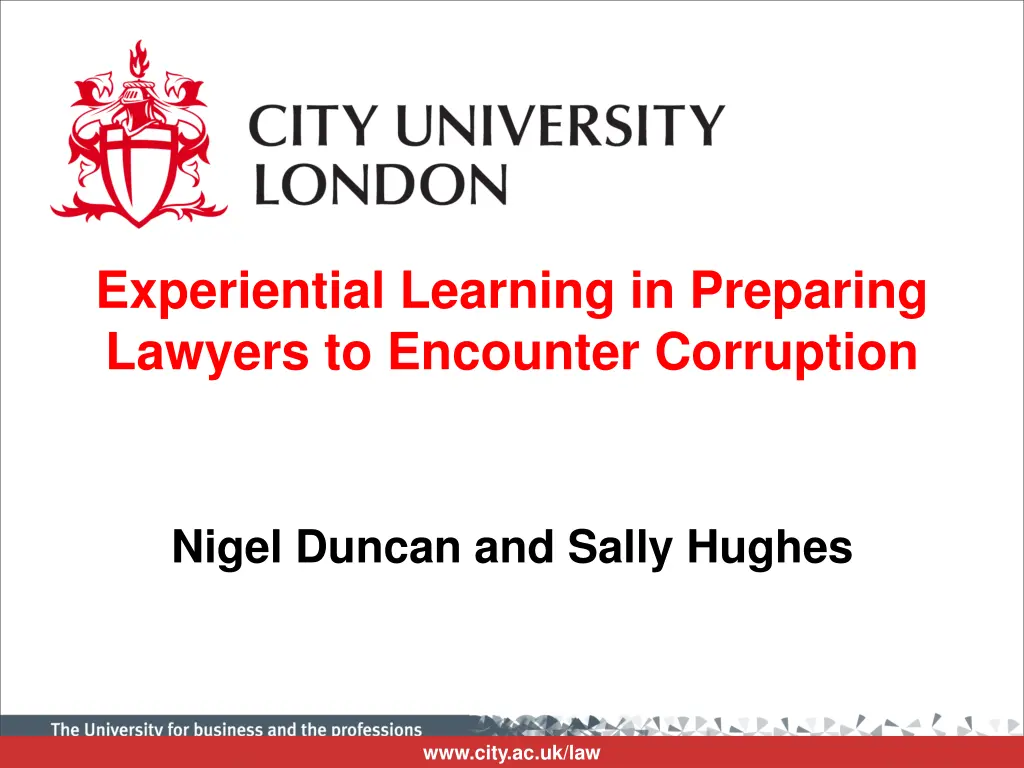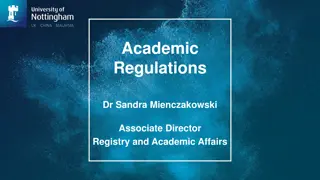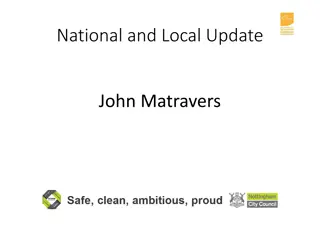
Corruption in the Legal World: HSBC Scandals Unveiled
Explore the impact of corruption on the legal profession through a deep dive into the HSBC scandals, where systemic issues and regulatory challenges have come to light. Delve into how lawyers are being prepared to tackle corruption in today's complex global landscape.
Download Presentation

Please find below an Image/Link to download the presentation.
The content on the website is provided AS IS for your information and personal use only. It may not be sold, licensed, or shared on other websites without obtaining consent from the author. If you encounter any issues during the download, it is possible that the publisher has removed the file from their server.
You are allowed to download the files provided on this website for personal or commercial use, subject to the condition that they are used lawfully. All files are the property of their respective owners.
The content on the website is provided AS IS for your information and personal use only. It may not be sold, licensed, or shared on other websites without obtaining consent from the author.
E N D
Presentation Transcript
Experiential Learning in Preparing Lawyers to Encounter Corruption Nigel Duncan and Sally Hughes www.city.ac.uk/law
Has corruption gone mainstream? 2008 financial crash exposed systemic corruption within major banks and financial services corporations. Too big to fail , and sufficiently powerful to challenge governments, the traditional rule of law seems threatened. We ask how a new generation of lawyers, working independently or within the system, can be prepared for a uniquely and challenging role. www.city.ac.uk/law
What happened at HSBC? UK s largest publicly quoted corporation and the third largest bank world-wide by assets, it employs 257,000 people world-wide. Senate hearings in 2012 led to early hearings for a prosecution for money-laundering for Mexican drug barons. HSBC settled under a Deferred Prosecution Agreement for $1.9bn fine, plus an external sanctions (compliance) programme. 2013: HSBC among many banks fined for fixing of LIBOR. 2014: HSBC one of five major banks fined 2bn for manipulating FOREX rate. 2013-15 Swiss branch exposed for illegally concealing client transactions and secretly promoting tax avoidance schemes. www.city.ac.uk/law
Immunity or impunity for compliance ? Recently, in a PR war in which HSBC threatened a UK withdrawal: Doubt cast on assurances of internal monitoring and compliance by Lee Hale, HSBC head of sanctions immediately contradicted by the bank. Swiss authorities fined HSBC for money-laundering. US authorities court application to suppress a 1000-page report detailing progress on HSBC s external monitoring because inadequate compliance raises the prospect of publicising criminal openings at the bank. To date: neither HSBC nor any HSBC employee has been tried for any criminal offence relating to the bank s corrupt activities. www.city.ac.uk/law
How HSBC got away with it? Regulation rather than enforcement Self monitoring and compliance allow global businesses to negotiate justiciable issues leave the arena of accusatorial, open justice potentially undermine the rule of law Criminal prosecutions limited to individuals. www.city.ac.uk/law
Law firms and lawyers driven by big money Corporate structures for law firms have diversified Firms floated on investment markets will be profit driven Employment within the big commercial firms serving the corporate world is valuable, competitive but potentially tenuous for the individual. Banks global legal spend now at 200bn RBS litigation war chest set at 1.9bn www.city.ac.uk/law
What are the drivers for new lawyers? Valuable, long-running contracts with rich businesses contrast with stereotypical law firm in which the lawyer has a transient, individualised client base. SRA key risks to regulatory objectives include Lack of independence Impact of increased variety of business structures Formation of large structures and group contagion Conflicting norms of practice and ethical principles www.city.ac.uk/law
Duties to the state v. duties to clients Boon and Levin identify new and growing duties to collective third parties derived from duty owed to the Court . Now gatekeeping responsibilities to the state and society, include: money laundering reporting proceeds of crime reporting suspicious transactions reporting client identity verification Impacts of which conflict with client confidentiality chip away at legal privilege create role strain for lawyers within corporate culture. www.city.ac.uk/law
Clashing cultures 1. Legal ethics are based on legalism and legalistic concepts multi-layered duties defined rules client confidentiality (qualified) acting in the client s interests (qualified) 2. Business ethics in finance based on personal and individualised trust - gentlemen s agreement etc pragmatism commercial secrecy loyalty to the company www.city.ac.uk/law
Anti-Corruption Academic Initiative The OECD, the IBA and the UNODC http://www.track.unodc.org/Education/Pages/ACAD.aspx How does this prepare the individual to face this challenge? www.city.ac.uk/law
Four Component Model of Morality (Rest, 1983) Reasons (or predictors) Moral Blindness Faulty Reasoning Lack of Motivation Ineffectiveness (Character or Competence) Professional Misconduct www.city.ac.uk/law
Four Component Model of Morality (Rest, 1983) Moral capacity (predictors) Operational definition Capacity to interpret ambiguous clues in real-life settings Moral sensitivity Capacity to analyse moral issues and provide justifications for decisions Moral judgment Capacity to internalise and give priority to professional values Moral motivation Capacity for empathic interaction and problem solving Moral implementation Effective Professional Conduct www.city.ac.uk/law
Teaching only the law: May encourage efforts to minimise ethical rules through interpretation Fails to develop capacity to : Recognise ethical dilemmas; Analyse and justify ethical decisions; Internalise and adopt professional values; Implement the ethically proper response. An inevitable apprenticeship Sullivan et al, Educating Lawyers, law school years constitute a powerful moral apprenticeship . www.city.ac.uk/law
How assist students to develop these capacities? Experiential methods that engage the affective as well as the cognitive domain. Hartwell: teaching legal ethics and professional responsibility in small, highly interactive seminars had a strong positive impact on students moral judgment. Bebeau: introducing comprehensive ethics curriculum had marked impact on student scores on Defining Issues Test. Gentile, Giving Voice to Values: well-established approach to developing capacity for moral implementation. www.city.ac.uk/law
Please work in groups How would you like to help your students to understand this challenge and to gain experience of addressing it? Please consider: Materials you would need to prepare Activities students would undertake How you would encourage their reflection How this would fit into your curriculum www.city.ac.uk/law
References Bebeau, M, Influencing the Moral Dimensions of Dental Practice in Rest and Narvaez, (eds), Moral Development in the Professions: Psychology and Applied Ethics, (1994, Hillsdale:Ehrlbaum) Boon, A & Levin, J, The Ethics and Conduct of Lawyers in England & Wales, (2nd ed., 2007, Hart) Cunningham, C, & Alexander, C, Developing Professional Judgment , in Robertson et al (eds) The Ethics Project in Legal Education, (2010, London: Routledge) Duncan, N, Addressing Emotions in Preparing Ethical Lawyers in Maharg & Maughan (eds), Teaching and Reaching the Whole Student the Impact of Emotions on Learning (and Teaching) the Law. (2011, Dartmouth: Ashgate). Duncan, N, A future for legal education: personal and professional development and ethics (2015, Notts LJ, ) Hartwell, S, Promoting moral development through experiential teaching . 1994, 1 Clinical Law Review 505-540. Kohlberg, L, Essays on Moral Development Vol. 1: The Philosophy of Moral Development. (1981 San Francisco: Harper and Row). Rest, J, Background: Theory and Research , in Rest and Narvaez (above) SRA, Risk Outlook 2014/15 The key risks to the regulatory objectives July 2014 Sullivan, W, et al, Educating Lawyers: Preparation for the Profession of Law, Carnegie Foundation for the Advancement of Teaching, (2007, San Francisco: Jossey-Bass) www.city.ac.uk/law






















